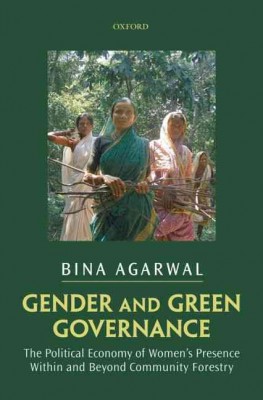| Gender and Green Governance: The Political Economy of Women's Presence Within and Beyond Community Forestry Contributor(s): Agarwal, Bina (Author) |
|
 |
ISBN: 0199569681 ISBN-13: 9780199569687 Publisher: OUP Oxford OUR PRICE: $123.50 Product Type: Hardcover - Other Formats Published: September 2010 |
| Additional Information |
| BISAC Categories: - Business & Economics | Environmental Economics - Nature | Natural Resources |
| Dewey: 333.750 |
| LCCN: 2010281739 |
| Physical Information: 1.5" H x 6.1" W x 9.3" (2.10 lbs) 496 pages |
| Descriptions, Reviews, Etc. |
| Publisher Description: Economists studying environmental collective action and green governance have paid little attention to the question of gender. Research on gender and green governance in other disciplines has focused mainly on women's near absence from forestry institutions. This interdisciplinary book turns that focus on its head to ask: what if women were present in these institutions? What difference would that make? Would women's inclusion in forest governance--undeniably important for equity--also affect decisions on forest use and outcomes for conservation and subsistence? Are women's interests in forests different from men's? Would women's presence lead to better forests and more equitable access? Does it matter which class of women governs? And how large a presence of women would make an impact? Answers to these questions can prove foundational for effective environmental governance, yet they have been subject to little empirical investigation. In an analysis that is conceptually sophisticated and statistically rigorous, using primary data on community forestry institutions in India and Nepal, this book is the first major study to comprehensively address these wide-ranging issues. It traces women's history of exclusion from public institutions, the factors which constrain their effective participation, and how those constraints can be overcome. It outlines how strategic partnerships between forestry groups and other civil society institutions could strengthen rural women's bargaining power with community and government. And it examines the complexities of eliciting government accountability in addressing poor rural women's needs, such as for clean domestic fuel and access to the commons. Located in the interface of environmental studies, political economy and gender analysis, the volume makes significant original contributions to current debates on gender and governance, forest conservation, clean energy policy, critical mass and social inclusion. Traversing uncharted territory with rare analytical rigor, this lucidly written book will be of interest to scholars and students as well as policy makers and practitioners. |